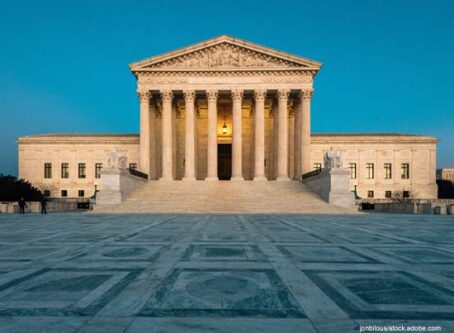Trucking insurance company’s ‘act of God’ claim fails in $21M crash case
A Georgia federal court has decided that Cypress Insurance is on the hook for a $21 million jury verdict in a fatal truck/pedestrian crash lawsuit. In one of several arguments it made, the company tried to argue the crash was an act of God.
On Aug. 21, Judge Richard W. Story of the U.S. District Court for the Northern District of Georgia denied Cypress Insurance’s request for a new trial after a jury decided its client, J.W. Harper Farms, was responsible for a fatal 2016 crash.
Owner-operator James Windell Harper was traveling on Highway 369 westbound on December 2016 in Gainesville, Ga., delivering a load. At the same time, Kip Eugene Holland was walking along the westbound shoulder of that highway headed eastward.
According to the complaint, Harper began swerving and driving erratically for more than 2 miles. He ended up losing control of the truck, driving off the outside edge of the pavement. The trailer overturned, disconnecting from the tractor and striking Holland. Holland died as a result from the injuries later that day.
In June 2017, the estate of Holland filed a lawsuit against Harper for negligence and Cypress Insurance for liability of said negligence. After a four-day trial, a jury found Harper’s negligence caused the crash and Cypress Insurance liable in February. The $21 million award included $13 million for wrongful death and $2 million for pain and suffering. The verdict also included $6 million for litigation expenses for Holland’s attorneys.
Cypress Insurance challenged the verdict, claiming:
- Direct action against Cypress Insurance is improper because Holland failed to prove it filed a certificate of insurance with the appropriate state authority and because Harper was an interstate motor carrier.
- It is not liable because the accident was caused by an “act of God.”
- Holland failed to prove bad faith in the transaction and therefore is not entitled to attorney’s fees.
- The amount of attorney’s fees is unreasonable and against the weight of the evidence.
- Evidence does not support jury charge on actual pain and suffering.
- Holland’s improper closing argument misled the jury as to a central issue in the case.
Regarding issues of Harper being an interstate carrier, the court pointed to a previous case that made the same argument. In that case, the court found direct action statutes apply to both intrastate and interstate carries. The kicker: the law firm representing Cypress Insurance also represented the plaintiff in that case.
Cypress Insurance also argued that Harper’s erratic driving was the result of an act of God. Specifically, Harper allegedly experienced a sudden and unforeseeable illness causing him to become incapacitated.
However, the insurance company did not produce a medical expert to support that theory.
The bad faith in transaction allegation stems from evidence revealing that Harper left out pertinent information on his Federal Motor Carrier Safety Administration medical exam. Among the information left out was a prescription for hydrocodone.
Although there was conflicting evidence regarding whether Harper drove while under the influence of painkillers, evidence at minimum reveals that Harper misrepresented his medical condition repeatedly in order to maintain his CDL.
Cypress Insurance tried to argue that the instantaneous death of Holland does not warrant pain and suffering damages. The original complaint claims Holland “suffered injuries to his mind and body, including pre-impact shock, fright, terror, and mental pain and suffering from the time he saw the tractor-trailer approaching until he died.” During trial, jurors saw video footage of the impact that attorney’s argued reveal “Holland’s appreciation of the imminent collision,” the court order states. Questions of whether or not Holland was alive immediately after the impact were addressed with witness testimony claiming Holland was heard moaning at least once. That testimony was enough for the jury and the court to award pain and suffering damages.
Lastly, Cypress Insurance claimed that Holland’s attorneys misstated the law during closing arguments. However, the court immediately addressed that concern at the time and instructed the jury accordingly.
Cypress also argues that plaintiff’s attorney mentioned how they were not allowed to examine Harper, suggesting Harper has something to hide. Holland’s attorney did say it was regrettable that Harper could not share his side of the story. However, the full context reveals more. Attorneys for Holland also acknowledged that Harper had died before he could provide testimony. In context, the court found nothing prejudicial about the statement.
Denying all of Cypress Insurance’s claims, the court’s decision maintains the multimillion dollar verdict.









